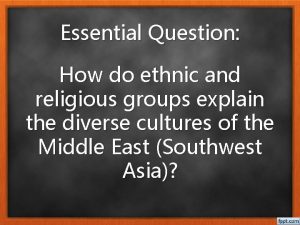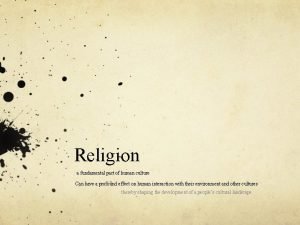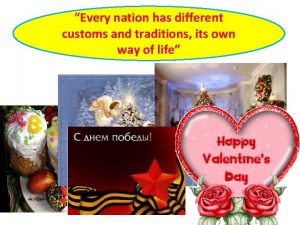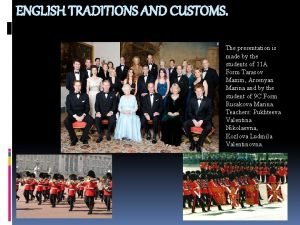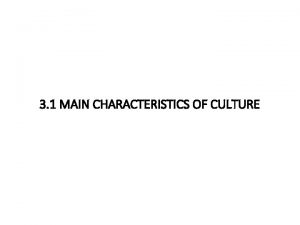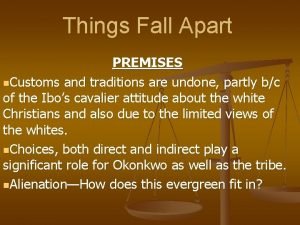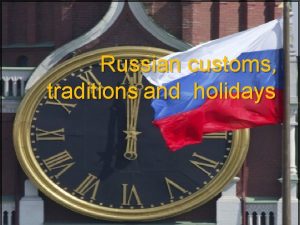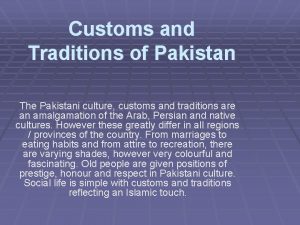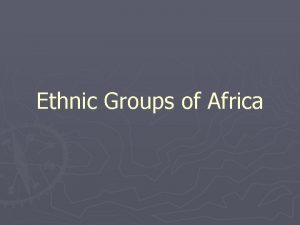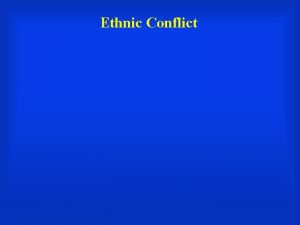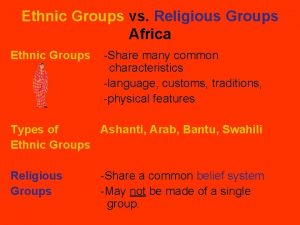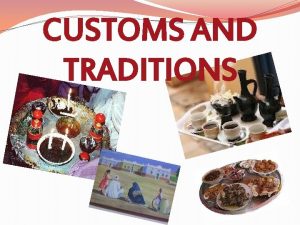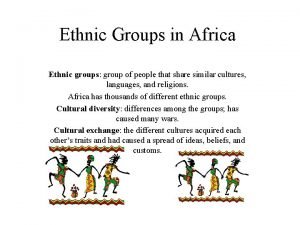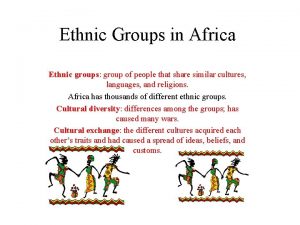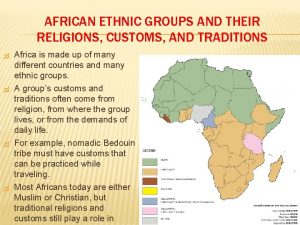Ethnic Groups of Africa Religions Customs and Traditions











- Slides: 11

Ethnic Groups of Africa

Religions, Customs, and Traditions • Africa is made up of 54 different countries and many ethnic groups. • A group’s customs and traditions often come from religion, from where the group lives, or from the demands of daily life. • Most Africans today are either Muslim or Christian, but traditional religions and customs still play a role in African culture.

Arabs • The term Arab refers to a mixed ethnic group made up of people who speak the Arabic language. • Arabs mostly live in North Africa and the Middle East. • Some Jews, Kurds, Berbers, Copts, and Druze speak Arabic, but are not usually considered Arab. • The term “Arab” includes Arabic-speaking Christians in Syria, Lebanon, Israel, and Jordan. Overall, Arabs are divided into two groups— nomadic Bedouins and settled Arabs.

Ashanti • The Ashanti people live in central Ghana. • The family, especially the mother’s family, is most important to the Ashanti. • They believe that children inherit their spirits from their father and their flesh and blood from their mother. • The mystical Golden Stool has been the center of Ashanti spiritual practice since the late 17 th century.

Ashanti • It is said to have arrived on Earth by floating down from the heavens. • The Ashanti people believe the strength of their nation depends on the safety of this stool. • It represents the unity of the Ashanti and the power of their chiefs. • The Ashanti honor kings after death, in a ceremony in which a stool is blackened.

The Swahili People • The Swahili people live on the East African coast from southern Somalia to northern Mozambique. • The Swahili people practice a strict form of Islam. In addition to Islamic beliefs, the Swahili believe in spirits, or djinns. • Swahili Muslims use trances to speak to djinns. • Men wear amulets around their necks that contain verses from the Koran, which they believe will protect them. • Only teachers of Islam and prophets are permitted to become spiritual healers.

Bantu • The Bantu originally came from southeastern Nigeria, near the Benue-Cross Rivers that spread east and south near Zambia, in Central Africa. • Around 1000 CE, the Bantu reached present-day Zimbabwe and South Africa. • Here, the Bantu established the Munhumutapa Empire. • This new empire controlled trading routes from South Africa to the area north of the Zambezi River.

Bantu • The Bantu traded many natural resources: gold, copper, precious stones, animal hides, ivory, and metal goods. • They traded with Arab traders from the Swahili coast, as well as others. • The empire collapsed in the early 16 th century, after it used up all its resources.

African Literacy • The literacy rate in Africa is 50%. • This means that half the population of Africa cannot read or write. • Literacy is good for individuals as well as their communities. • More developed countries tend to have a higher literacy rate. • Sudan and Egypt both have a literacy rate of only 51 %. • South Africa, the most developed country in Africa, has a literacy rate of 83%.

Art and Music from Africa • The dance and music of Africa has many distinct styles and uses unique instruments. • Sub-Saharan African music and dance is different from the music and dance of the Arab cultures of North Africa, or the Western settler populations of southern Africa. • Many of the Sub-Saharan traditions are maintained by oral tradition.

Summary • Describe the diverse cultures of the people of Africa and how literacy rate affects standard of living.
 How are ethnic groups and religious groups related
How are ethnic groups and religious groups related Taliban vs western values ap human geography
Taliban vs western values ap human geography World's largest ethnic religion
World's largest ethnic religion Followers of primal indigenous ethnic religions do not
Followers of primal indigenous ethnic religions do not Unit 4: our customs and traditions
Unit 4: our customs and traditions Every nation has its own
Every nation has its own British traditions and customs presentation
British traditions and customs presentation Culture is shared
Culture is shared Things fall apart customs
Things fall apart customs Customs and traditions in russia
Customs and traditions in russia Navy customs and traditions
Navy customs and traditions Customs and traditions of pakistan
Customs and traditions of pakistan
